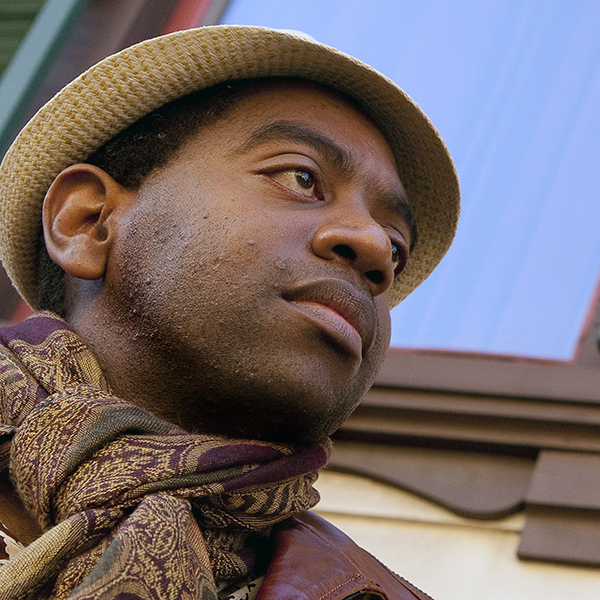Yosvany Terry, an internationally acclaimed musician and composer, has spent years exploring the rich tapestry of Afro-Cuban music and its profound connections to West African musical traditions. As a senior lecturer at Harvard and the director of the Harvard Jazz Ensembles, Terry is dedicated to bridging the gap between these cultural heritages and contemporary arts education. His recent travels to Benin, alongside his deep roots in Cuba, have provided him with unique insights into the musical dialogues that continue to shape both regions. Through research and performances, Terry aims to safeguard these traditions while encouraging a new generation of artists and students to engage with their historical significance. With upcoming performances such as “Imaginary Dialogues: Dahomey,” he seeks to connect these vibrant artistic legacies to modern audiences and inspire further exploration in the realm of jazz and beyond.
In the world of music, few artists have managed to intertwine diverse cultural influences like Yosvany Terry. His work delves into the fascinating realm where Afro-Cuban rhythms fuse with the rich sounds of West African heritage, creating a soundscape that is both historical and modern. As a key figure in Harvard’s arts community, Terry’s focus on these musical lineages highlights the importance of cross-cultural exchanges in shaping identity and artistic expression. By participating in initiatives such as ArtsThursdays, he fosters a rich learning environment that not only showcases traditional music but also emphasizes its influence on contemporary genres including jazz. This exploration of musical traditions not only enriches the curriculum at Harvard but also enhances students’ overall understanding of the arts.
Exploring the Connection Between Afro-Cuban Music and West African Traditions
Afro-Cuban music is deeply rooted in the cultural and musical traditions of West Africa. During his recent travels, Yosvany Terry uncovered the intricate connections that link these two diverse musical landscapes. In regions of Benin, the birthplace of many African musical traditions, Terry engaged with local musicians who shared their heritage, revealing how traditional rhythms, instruments, and vocal styles have transcended geographical boundaries to influence Cuban music. These experiences not only highlight the importance of preserving cultural identity but also demonstrate how the vibrant sounds of Africa continue to resonate within the heart of Afro-Cuban music.
Understanding the ways in which West African music has shaped Afro-Cuban genres such as salsa and son illuminates the broader narrative of the African diaspora. Through his research, Terry emphasizes the significance of these musical exchanges and their impact on contemporary music. As he integrates his findings into his teaching, he aims to instill in students a sense of appreciation for these legacy traditions, ultimately fostering a deeper connection to their own musical identities.
Yosvany Terry’s Cultural Research and Its Impact on Education
Yosvany Terry’s commitment to cultural research transcends his role as a musician; he strives to enrich the educational landscape at Harvard by incorporating his learnings about West African and Afro-Cuban traditions into the curriculum. By providing students access to primary source materials, Terry enhances their understanding of historical and contemporary music contexts. This approach not only elevates the learning experience but also inspires students to explore the intricate layers of cultural influences that shape their musical endeavors.
Terry’s vision for integrating arts education with historical research serves to cultivate a new generation of artists who are informed and responsive to their cultural heritage. His students are encouraged to explore these connections actively, breathing new life into the musical traditions that inform their practice. The framework established by Terry presents an opportunity for students to understand their own identities and the social narratives embedded within the music they create.
The Role of Harvard Jazz Ensembles in Expanding Musical Traditions
As director of the Harvard Jazz Ensembles, Yosvany Terry plays a pivotal role in broadening the scope of jazz education. He has enriched the program by inviting renowned artists of Afro-Latin American descent, emphasizing the significance of diverse cultural influences in jazz music. This inclusive approach not only celebrates the genre’s history but also reflects the diverse nature of contemporary society, allowing students to engage with various musical styles and traditions. By collaborating with master musicians, students are exposed to a rich tapestry of sounds that shape their understanding of jazz within a global context.
The ensemble’s educational trips to countries like Cuba and the Dominican Republic further exemplify Terry’s commitment to immersive learning. These experiences prioritize cultural engagement over tourism, enabling students to connect authentically with international educators and musicians. Through workshops and jam sessions, students gain firsthand insights into the musical traditions that have informed jazz and other genres, fostering a sense of shared learning that transcends borders and celebrates the universal language of music.
ArtsThursdays: A Catalyst for Artistic Collaboration at Harvard
ArtsThursdays represents a significant initiative that showcases the vibrant artistic community at Harvard, bridging the gap between academia and the arts. Yosvany Terry’s participation illustrates how these events elevate the profile of arts education, providing platforms for faculty to engage with their communities as active artists. The inclusion of free concerts and collaborative workshops fosters an environment where students and faculty alike are inspired to explore new artistic possibilities and build connections across disciplines.
During events like ArtsThursdays, the intersection of various art forms—including music, dance, and visual arts—is celebrated, further enriching the educational experience for all participants. Terry’s upcoming performance, which draws from his research in Benin and Cuba, exemplifies the profound connections between artistic inquiry and performance. This full-circle approach not only enriches attendees’ understanding of cultural traditions but also underscores the importance of collaboration in cultivating a robust arts presence within the University.
The Importance of Preserving Musical Traditions
Preserving musical traditions is crucial for maintaining cultural identity, especially in the face of globalization and cultural homogenization. Yosvany Terry’s research highlights how communities in West Africa and the Caribbean have safeguarded their cultural practices through music. For many, these traditions serve as tools of resistance, allowing them to express their unique identities and histories despite the pressures to assimilate. By protecting these forms of expression, musicians and artists play a vital role in keeping the spirit of these cultures alive.
Through the integration of traditional music into contemporary settings, artists like Terry ensure that the narrative of these cultural identities continues to thrive. As an educator, his mission is to illuminate these connections for students, helping them understand the significance of musical heritage in shaping modern cultural landscapes. This knowledge empowers students not only to appreciate their musical roots but also to continue the legacy of artistic expression that has shaped their communities.
Cultural Identity Through Music: A Journey of Discovery
For Yosvany Terry, the journey through various musical traditions has been a profound exploration of cultural identity. By tracing the roots of modern jazz back to West African traditions, he uncovers the stories and struggles that are embedded in music. This research not only deepens his understanding as a musician but also allows him to share these insights with his students, fostering a comprehensive approach to their arts education. Music acts as a vessel through which individuals can express their heritage, tell their stories, and connect with broader cultural narratives.
The interplay between cultural identity and music becomes a powerful teaching tool in Terry’s approach. He emphasizes the importance of recognizing the historical context of the music students study, encouraging them to see beyond notes and rhythms to the rich background that informs their sound. By creating a curriculum that intertwines these elements, Terry empowers his students to embrace their identities fully while making connections to the diverse musical traditions around them.
Documenting Musical Heritage: The Role of Technology in Arts Education
As music continues to evolve, the role of technology in documenting and preserving musical heritage becomes increasingly relevant. Yosvany Terry’s collaboration with filmmakers and historians exemplifies this integration, as he aims to create a documentary that bridges the historical context of the Kingdom of Dahomey with contemporary jazz music. Such projects not only serve to document cultural practices but also help to disseminate this knowledge to broader audiences, initiating conversations about cultural preservation and the importance of artistic expression.
By utilizing modern technology, artists and educators can capture the essence of musical traditions in ways that resonate with younger generations. This innovative approach to sharing cultural stories enhances the educational experience, allowing students to engage with the content in a dynamic and interactive manner. Terry’s efforts illuminate the potential for technology to preserve art while also fostering a deeper appreciation for the traditions that shape our musical landscapes.
The Future of Arts Education at Harvard
Yosvany Terry’s vision for the future of arts education at Harvard emphasizes growth and inclusivity. By continuing to expand offerings to include diverse musical traditions, the department caters to a wider audience, encouraging student engagement with newly accessible cultural narratives. This evolution in curriculum reflects a commitment to making the arts a vital part of the university experience for all students, regardless of their backgrounds or previous knowledge.
Moreover, Terry’s focus on securing visiting artists and establishing collaborations across departments underscores the importance of a multidisciplinary approach to arts education. By fostering connections among various fields, the program seeks to create innovative spaces for cultural exchange that enhance understanding and appreciation for the arts. As arts education continues to evolve, there lies tremendous potential for Harvard to lead the way in developing a rich, diverse artistic presence that resonates within and beyond the university.
The Transformative Power of Collaboration in the Arts
Collaboration is at the heart of both artistic practice and education, as emphasized by Yosvany Terry’s work at Harvard. By bringing together artists from various backgrounds and disciplines, he creates an environment where students can learn from diverse perspectives and experiences. This collaborative approach not only enhances their artistic practice but also inspires innovation and creativity, encouraging budding artists to think beyond traditional boundaries and explore new avenues in music.
Furthermore, the partnerships formed through collaborative endeavors extend beyond the classroom, enriching the community with cultural exchanges that celebrate shared experiences. As Terry continues to foster these connections, he empowers students and faculty alike to envision how interdisciplinary work can transform the educational landscape. In doing so, he ensures that the principles of diversity and inclusion remain central to the mission of the arts at Harvard.
Frequently Asked Questions
What is Yosvany Terry known for in the realm of Afro-Cuban music?
Yosvany Terry is widely recognized as an influential musician and composer in Afro-Cuban music, specializing in exploring the links between traditional West African rhythms and contemporary jazz. His work not only celebrates these musical traditions but also educates others about their historical significance and cultural context.
How does Yosvany Terry incorporate West African music into his performances?
Yosvany Terry infuses West African music into his performances by utilizing traditional rhythms and melodies learned from his research trips to regions like Benin. His compositions often reflect a blend of Afro-Cuban elements with the rich musical heritage of West Africa, showcasing how these cultures intersect.
What role does Yosvany Terry play at Harvard in relation to the jazz ensembles?
As a senior lecturer and director of the Harvard Jazz Ensembles, Yosvany Terry plays a crucial role in bridging musical traditions by introducing students to Afro-Cuban and West African music. He emphasizes cross-departmental collaboration and encourages students to explore diverse musical forms and their histories.
What is the significance of Yosvany Terry’s research on musical traditions at Harvard?
Yosvany Terry’s research on musical traditions is significant at Harvard because it enriches the curriculum by providing students with firsthand insights into the impact of the African diaspora on modern jazz and its evolution. This knowledge helps students appreciate their cultural heritage and influences their artistic expressions.
How does Yosvany Terry view the importance of arts education in fostering cultural identity?
Yosvany Terry considers arts education vital in fostering cultural identity as it allows students to connect with their roots and understand the cultural significance of musical traditions. He believes that by learning about these traditions, students can appreciate their historical context and the resilience embedded in them.
What impact does Yosvany Terry hope to achieve through his teaching and performances at Harvard?
Through his teaching and performances, Yosvany Terry aims to inspire students to recognize the value of Afro-Cuban and West African music, encouraging them to become advocates for these traditions. He seeks to cultivate a deeper understanding of how music shapes identity and culture in society.
Will Yosvany Terry’s upcoming performance include elements of his research on musical traditions?
Yes, Yosvany Terry’s upcoming performance, ‘Imaginary Dialogues: Dahomey,’ will incorporate elements from his research on Afro-Cuban and West African musical traditions. This performance is set to highlight the cultural connections between these traditions, showcasing the synthesis of ideas and sounds he has discovered.
How does Yosvany Terry integrate collaboration within the arts community at Harvard?
Yosvany Terry actively promotes collaboration by inviting diverse artists from various musical backgrounds to participate in Harvard’s jazz programs. His initiatives foster a multidisciplinary approach to learning, where students benefit from interacting with musicians from different cultures, thus expanding their artistic horizons.
Why is Yosvany Terry’s work considered essential for the future of the arts at Harvard?
Yosvany Terry’s work is essential for the future of the arts at Harvard because it drives the integration of diverse musical traditions into the curriculum, promoting inclusivity and a broader understanding of art. His initiatives help ensure that the arts remain a dynamic and relevant part of the university’s offerings.
What themes are explored in Yosvany Terry’s compositions based on his research?
In Yosvany Terry’s compositions, themes of cultural identity, resistance, and the historical connections between Africa and the Americas are explored. His work often reflects the stories and traditions of the Afro-Cuban experience, highlighting their relevance to contemporary musical landscapes.
| Key Points | Details |
|---|---|
| Yosvany Terry’s Research | Investigates the links between Benin and Caribbean musical traditions, exploring the impact of the African diaspora. |
| Cultural Preservation | Terry emphasizes how traditions were safeguarded as a form of cultural identity among slaves in Cuba, impacting various music genres. |
| Educational Impact | Plans to integrate findings into classroom teachings, giving students direct access to primary cultural sources. |
| Personal Artistic Growth | Research inspires new compositions and projects, including an opera highlighting historical freedoms and rebellions. |
| Harvard and ArtsThursdays | ArtsThursdays promotes visibility of the arts at Harvard, encouraging interdisciplinary collaboration and public engagement. |
| Future Aspirations | Terry envisions a broadening of musical traditions and visitor artist programs to enrich the Harvard arts community. |
Summary
Yosvany Terry stands at the forefront of musical exploration, connecting the rich traditions of Benin and Cuba to influence contemporary music. His dedication to cultural preservation and education not only enhances the understanding of jazz and its roots but also inspires the next generations of musicians. Terry’s work is essential in fostering an appreciation for the interconnectedness of world music and heritage, ultimately enriching the artistic landscape at Harvard and beyond.



MOST COMMENTED
Culture News
Katie Kitamura: Exploring Horror in Midlife Fiction
Culture News
Canine Empathy Research: Insights from Harvard Experts
Culture News
Introductory Humanities Courses: Engaging First-Year Students
Culture News
Canine Research: Exploring the Human-Dog Connection
Culture News
Introductory Humanities Courses Engaging First-Year Students
Culture News
Afro-Cuban Music: Yosvany Terry’s Cultural Explorations
Culture News
Artificial Intelligence in Photojournalism: A New Hope